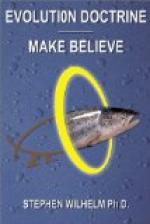But its life is incomplete if it stops with the furtherance of aims that we may call purely selfish. Nature also demands that an Amoeba, again like every other living thing, shall perpetuate its kind. The mode by which it reproduces is ordinarily quite simple; the animal grows to a certain bulk and then it divides into two masses of protoplasm, each of which receives a portion of the mother nucleus. Sometimes by a peculiar process it breaks up into numerous small fragments called spores, which also receive portions of the parent nucleus. The most striking feature in both kinds of reproduction in Amoeba is the complete destruction of the individual parent that exists before the act and does not afterwards. It is quite true that every part of the mother animal passes over into one or another of its products, but it is equally true that no one of these products is by itself the original individual. So even the simplest animal we know performs a task that is not only useless to itself, but is completely destructive of itself, for nature’s greater purpose of preserving the race. We can readily see why this must be so; there is no place in the world for a species whose members put individual well-being above the welfare of the race, for which the production of new generations is essential, even though the satisfaction of this demand should necessitate the sacrifice of the parent organism. We might hesitate to use the word “altruistic” in describing the self-destructive reproductive act of an Amoeba, because this word connotes some degree of consciousness of the existence of other than personal interests, and of the welfare of different individuals. There is no reason to believe that such conscious recognition of any natural duties is possible in the case of so low an organism. But the fact remains that the result worked out by nature is the same as though there were a definite understanding of real duties. Even this unitary organism, then, acts mechanically so as to fulfil two primal obligations, first to itself, through activities with individual benefit as the result, and to the race by the act of reproduction which closes its individual existence and inaugurates a new generation.
The life of this example, representing the whole series of one-celled organisms, is almost infinitely simpler than that of a member of a human community, yet it reveals the beginnings of certain characteristics of the latter. Here, it is true, the natural obligations in question are not like those which are ordinarily denoted social, but it is equally true that even in this most elementary instance a living thing does not live unto itself alone. It is easy to see the value to the species as a whole of obedience to the second great law—“Preserve thy kind.” But a little further thought makes it plain that even the performance of acts in compliance with the first mandate—“preserve thyself”—are not purely selfish,




